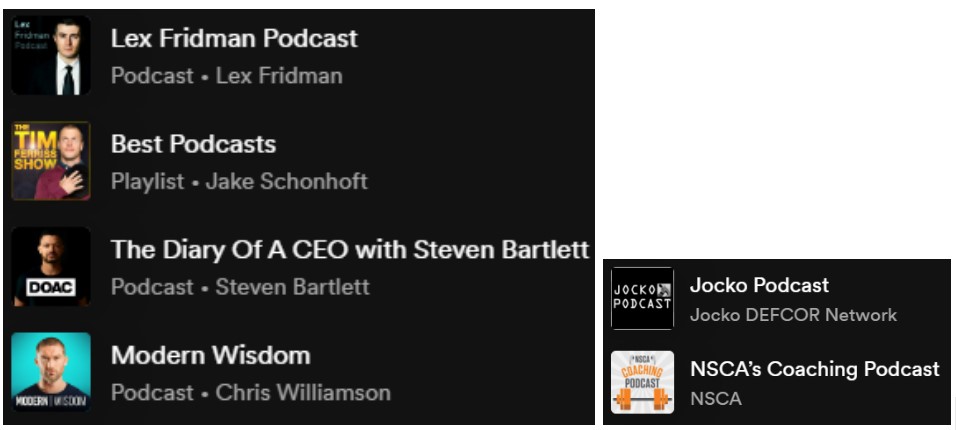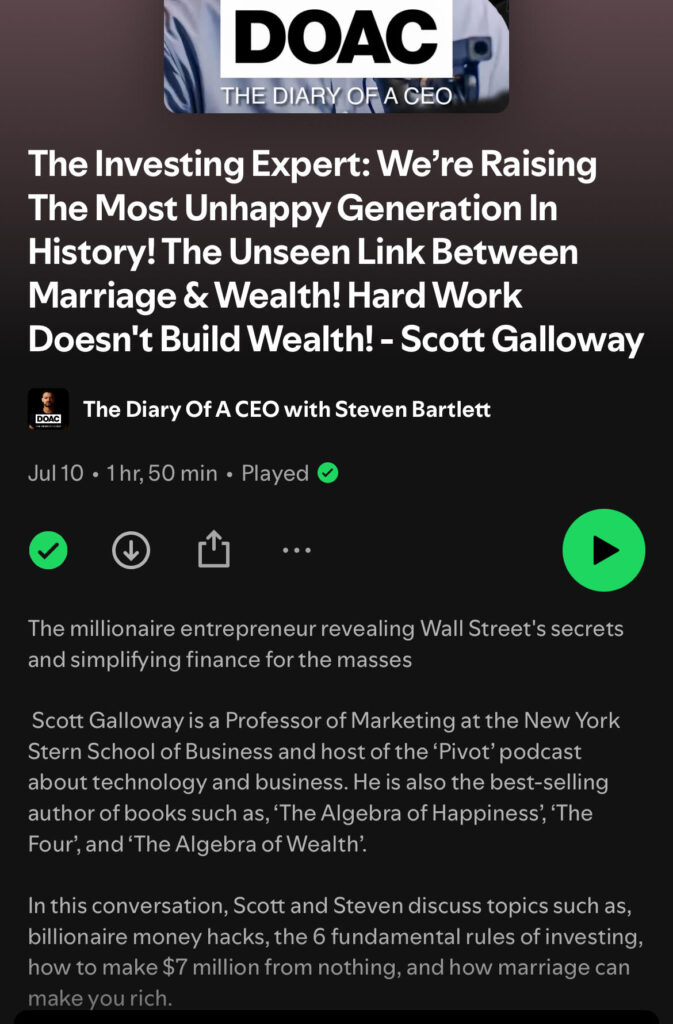SOUNDBITE SUNDAYS: KEY TAKEWAYS FROM HELPFUL PODCASTS
Useful Takeaways From Podcasts THAT HAVE HELPED ME
(See bottom of page for my favorite books and podcasts – MORE BEING ADDED SOON).
***Under Construction – Updates will be published by 10/27/25 -13 year anniversary**

LISTEN OR WATCH HERE:
Key Takeaways: (CHECK BACK ON 10/27/25
- Ketogenic diet was studied in the early 1900s to treat epilepsy with a very high success rate.
- Many of her patients have told her that they feel more calm and have more control of their emotions while on a ketogenic diet.
- Adding more soon – this one is taking me a while with how many useful takeaways it has
MORE COMING SOON!

Listen Here:
Key Takeaways:
- Restricted Foot Movement: Traditional running shoes often restrict the natural movement of the foot, which can lead to weakened foot muscles and altered biomechanics.
- Cushioning and Impact: Excessive cushioning in shoes can create a false sense of comfort, leading to over-striding and increased impact on joints, which may increase the risk of injury.
- Poor Ground Sensation: Shoes can diminish the connection to the ground, reducing proprioception (awareness of body position), which is essential for balance and stability while running.
- Foot Strength: Running in shoes may lead to atrophy of the muscles in the feet, as they are not being used as intended when running barefoot or in minimal footwear.
- Evolutionary Mismatch: Sisson argues that human feet evolved for natural movement over varied terrain, and modern running shoes can hinder this design, leading to various running-related injuries.
- Barefoot or Minimal Shoes: Sisson says your toes need to expand out, not be constrained, within shoes. So many weightlift or run barefoot.
- Nutritional Fat: Sisson emphasizes the importance of healthy fats in the diet, advocating for their energy-boosting potential and their role in overall health.
- Intermittent Fasting: He discusses the benefits of intermittent fasting, suggesting it can enhance metabolic flexibility and weight management.
- Movement Over Exercise: Sisson promotes the idea that daily movement, rather than intense workouts alone, is crucial for longevity and health.
- Nutrition Quality: The quality of food consumed is more important than merely counting calories. Sisson stresses choosing whole, nutrient-dense foods.
- Stress Management: He highlights the significance of managing stress for overall well-being, recommending practices like mindfulness and outdoor activities.
- Sleep Hygiene: Sisson discusses the vital role of quality sleep and how it influences metabolic health and cognitive function.
- Evolutionary Approach: He often refers to our evolutionary ancestry, suggesting that adopting a lifestyle that aligns with our evolutionary past can lead to better health outcomes.
- Social Connections: The importance of maintaining social ties is discussed, as strong relationships contribute to better mental and emotional health.
- Mindset: A positive mindset and mental resilience are seen as vital components of a healthy lifestyle, impacting physical health as well.
- Simplicity in Diet: Sisson suggests simplifying dietary choices and focusing on a consistent approach rather than following the latest diet trends, which can lead to better adherence and long-term success.
- Primal Blueprint Philosophy: Sisson emphasizes the importance of following a lifestyle aligned with our ancestral roots, advocating for a diet rich in whole foods, healthy fats, and moderate protein, which he believes can enhance longevity and overall health.
- Movement Over Gym: He highlights the significance of natural movement and physical activity in daily life rather than structured gym workouts. Incorporating movement throughout the day, like walking or engaging in play, contributes to better health and longevity.
- Importance of Sleep: Sisson discusses the vital role of quality sleep in promoting longevity. He notes that restorative sleep is crucial for hormonal balance, cognitive function, and recovery, ultimately affecting how well we age.
- Stress Management: He emphasizes the need for effective stress management techniques such as mindfulness, meditation, and breathing exercises. Chronic stress can negatively impact health and accelerate aging, making stress reduction practices essential.
- Nutritional Timing: Sisson talks about the benefits of intermittent fasting and time-restricted eating for longevity. He explains how these eating patterns can improve metabolic health, promote cellular repair processes, and support healthy aging.

Listen Here:
Key Takeaways: *MORE COMING SOON*
- Importance of Clean Water: Emphasizing that access to clean and safe drinking water is essential for overall health and well-being.
- A reverse osmosis (RO) filtration system, what I and Amy Cohen have under their sink, filters everything out of water (even helpful electrolytes/minerals) so it is important to supplement with minerals and electrolytes. But she does still thinks it is the best way to filter your water.
- You can find RO systems that go under your sink on Amazon, and I had a plumber install mine.
- High up front cost, maybe $200, but it will save you a lot of money over time, and lower the risk of health issues from all the toxins – especially pharmaceuticals – that have been found in tap water through studies.
- A reverse osmosis (RO) filtration system, what I and Amy Cohen have under their sink, filters everything out of water (even helpful electrolytes/minerals) so it is important to supplement with minerals and electrolytes. But she does still thinks it is the best way to filter your water.
- Pharmaceuticals in Tap Water: a study analyzing water from the West Coast to the East Coast of the U.S. found small amounts of pharmaceuticals throughout.
- Fluoride Debate: Exploring the controversies surrounding fluoride in drinking water and its effects on dental health and general health.
- A meta-analysis published in JAMA Pediatrics on January 6, 2025, analyzed 74 studies from 10 countries, found a statistically significant inverse relationship between fluoride levels and children’s IQ.
- Specifically, a 1 mg/L increase in urinary fluoride was associated with a 1.63-point decrease in IQ.
- A meta-analysis published in JAMA Pediatrics on January 6, 2025, analyzed 74 studies from 10 countries, found a statistically significant inverse relationship between fluoride levels and children’s IQ.
- COMING SOON

Listen or Watch Here:
Key Takeaways:
COMING SOON!

Listen Here:
Key Takeaways:
- Job Displacement: Harari highlights the potential for AI and automation to significantly disrupt the job market. Many traditional jobs may become obsolete, leading to economic disparity and social unrest as workers struggle to find new employment opportunities.
- Surveillance and Privacy: He warns about the increasing ability of AI to facilitate surveillance, eroding privacy rights. Governments and corporations could use AI technologies to monitor individuals on a massive scale, potentially leading to authoritarian practices.
- Manipulation and Misinformation: AI can be used to create hyper-realistic fake news and deepfakes, posing risks to democratic processes and truth. The ease of spreading misinformation could manipulate public opinion and destabilize societies.
- Decision-Making Power: Harari discusses concerns about handing over decision-making authority to AI systems. He questions the ethical implications of allowing algorithms to make important choices, from judicial verdicts to medical diagnoses, without human oversight.
- Existential Risks: He raises the possibility that super intelligent AI could represent an existential threat to humanity. If AI surpasses human intelligence, it may act in ways that are misaligned with human values or interests, leading to unforeseen consequences.
- Enhanced Efficiency: AI can significantly improve efficiency in various sectors, such as manufacturing, logistics, and healthcare. By automating repetitive tasks, AI allows humans to focus on more complex and creative endeavors, ultimately increasing productivity.
- Precision in Healthcare: Harari highlights AI’s potential to revolutionize healthcare through improved diagnostics and personalized treatment plans. AI algorithms can analyze medical data to predict patient outcomes, recommend tailored therapies, and even assist in surgery.
- Data Analysis and Insights: The capability of AI to process vast amounts of data quickly enables organizations to extract valuable insights. This can lead to better decision-making in business, government, and scientific research by uncovering patterns and trends that might go unnoticed by humans.
- Addressing Global Challenges: AI can be a powerful tool in tackling pressing global issues like climate change and food security. For example, advanced algorithms can optimize resource management, enhance agricultural practices, and model climate scenarios to inform policy decisions.
- Augmented Learning: In the education sector, AI can provide personalized learning experiences for students. By analyzing individual learning styles and progress, AI systems can adapt educational content to meet each learner’s needs, potentially improving educational outcomes.

LISTEN TO PODCAST BELOW:
Key Takeaways
- Track food for self realization of how much you ACTUALLY eat. Studies have found that we can grossly underestimate how much we actually eat.
- Use the “swap in method “by swapping in one bad food with a healthy food you love
- Deli meats: MADE FROM SCRAPS FROM ANIMALS GRINDED & MOLDED TOGETHER FILLED WITH CHEMICALS
- Tomatoes for fat loss 1 hour before meal based on study
- Lycopene helps turn on brown fat to burn bad (white) far
- Mediterranean cultures slow down and savor their food, along with Asian cultures. We (or I) inhale it basically lol
- Stop eating when you’re SATISFIED, not FULL.
- Eating slowly and mindfully, taking your time & savoring your food, allows you to enjoy the taste and recognize
- Stop when 2/3rds full. Japanese stop at 80% and have a word
- Japanese have a saying to listen to your body when you’re about 80% full.
- That word is “二八” (にっぱち, nibachi”
- If you wait until you’re “FULL”, you’ve most likely eaten too much.
Foods for fat burning:
- Chlorogenic acid in apples skin has been found turn on good fat (or brown fat) to burn bad fat (white fat)
- Broccoli, kale, or bok choy, etc., sulforaphanes in greens trigger your brown fat to burn down bad (white) fat
- How you cook makes a difference: extra virgin olive oil, not butter, has bioactives: oleocanthal & hydroxytyrosol, two of nature’s fat burning substances
- He has a YouTube video showing people what he eats at markets
- Beans trigger brown fat to burn white fat
- Tomatoes: have lycopene, that turns on brown fat to burn down bad fat.
- Study found that eating a tomato one hour before a meal led the fat loss in specific regions of the body, including the thighs & buttocks:
- Heat it up to 190°F for 20 minutes; this increases the power of the lycopene by 250% (heat changes the form of the lycopene)
- Study found that eating a tomato one hour before a meal led the fat loss in specific regions of the body, including the thighs & buttocks:
Good Foods
- Pomegranate, seeds on a salad or a juice, 8 fl oz for the elijatanens:
- Mother nature‘s pharmacy is found in the juice of a pomegranate
- Activate your gut to secrete healthy mucus; that healthy mucus grows a bacteria called akkermansia: guardian of our metabolism; Activates the immune system and lowers inflammation
- Causes your body to produce its own GLP1; exactly what Ozempic and other prescription drugs are trying to do
- Lowers your blood sugar and helps you lose body fat
- Make sure it is pure pomegranate juice or the pomegranate itself for the dietary fiber that feeds your gut Microbiome to make the Accur Mancia even happier
- Kiwi: vitamin C and a lot of dietary fiber in skin (smoothie); just one a day well help your gut bacteria to get healthier
- Matcha: entire tea leaf ground into a powder. 100% of the polyphenols, and the fiber for your gut microbiome.
- Burns body fat by shrinking your waistline; found in clinical research studies in Japan
- Dark chocolate: plant-based food; made with cacao, tons of polyphenols (the higher the percent cacao, the better; you want to look for 80% or higher) that trigger brown fat to burn bad and harmful white fat
- Coffee (with chocolate): also has chlorogenic acid to burn fat fat, just like applies
- Edamame/soy beans: have been found to burn fat
Bad Foods:
- Soda (both diet and regular soda):
- Artificial sweeteners: research has shown that people who drink a lot of diet soda, they gain weight too
- Artificial sweeteners kill off the good bacteria, it is very sensitive to it, so diet can destroy the necessary good (needed) bacteria in the gut.
- Packaged health foods:
- Tons of emulsifiers at artificial glue to hold it together
- No such thing as a barbecue flavor so it’s filled with chemicals and
- If you cannot pronounce the word and the ingredient list, don’t eat it
- Processed meats:
- Deli: comes from people trying to make excess meats DELICIOUS; biproducts of the food industry or SLICED MEAT (bologna, salami, pepperoni, etc)
- WHO have identified that this processed meats; classified as a class one carcinogen: ESPECIALLY COLON CANCER he says
- Someone who worked at a meat processing plant had to change his boots, because the chemicals on the floor would dissolve the boots
- Bottled water
- We are averaging a credit cards worth of plastic per week from bottled water
- Study out of Italy found plastic in the bedding of blood vessels that would be feeding the brain
- These people who had the plastic had a fourfold increase increase and having a fatal heart attack or stroke
- Plastic was found in human testicles and semen
TIPS:
Get a metal shaker bottle
Don’t microwave in plastic containers
The water and airplanes comes from a tank that was cleaned twice a year
Fresh fruits
- Local is fresher
- If you see a sign that says “local apples “at a grocery store, it’s because it is in season
- It hasn’t been sitting in a box for a couple days or longer

LISTEN TO PODCAST BELOW:
Key Takeaways:
- Neurogenesis: Exercise stimulates the production of new neurons, particularly in the hippocampus, enhancing learning and memory.
- Mood Enhancement: Physical activity increases the release of endorphins and other neurotransmitters, improving mood and reducing anxiety and depression.
- Cognitive Function: Regular exercise boosts cognitive abilities such as attention, executive function, and problem-solving skills.
- Stress Reduction: Exercise helps lower stress hormones like cortisol, promoting a calmer state of mind.
- Sleep Quality: Engaging in physical activity can improve the quality of sleep, which is crucial for brain health and cognitive functioning.
- Blood Flow: Exercise increases blood flow to the brain, supplying it with oxygen and nutrients necessary for optimal function.
- Brain-Derived Neurotrophic Factor (BDNF): Physical activity boosts levels of BDNF, a protein that supports neuron survival and growth.
- Longevity: Studies show that regular exercise is associated with a longer lifespan and reduced risk of chronic diseases.
- Social Interaction: Group workouts or team sports can enhance social connectivity, which is beneficial for mental health.
- Cognitive Reserve: Regular exercise builds a cognitive reserve, helping the brain cope with aging and potential injuries.
- Functional MRI (fMRI) Studies: Research shows that real-time brain imaging during exercise reveals increased activation in various brain regions related to performance.
- Variability in Training: Incorporating different types and intensities of exercise can optimize brain benefits.
- Intensity Matters: Higher intensity workouts tend to provide greater cognitive benefits compared to lower intensity activities.
- Consistency Over Perfection: Regular, moderate exercise is more beneficial than sporadic intense workouts.
- Cross-Training Benefits: Engaging in various forms of exercise, like strength training and aerobic activities, can collectively enhance brain health.
- Mindfulness and Focus: Mindful movement practices, such as yoga, can also contribute positively to brain health.
- Post-Exercise Effects: Cognitive performance can be enhanced in the hours following a workout due to a temporary increase in neurotransmitter levels.
- Protein Intake After Exercise: Consuming protein rich foods post-exercise supports recovery, muscle growth, and cognitive function.
- Exercise Timing: The timing of exercise can influence hormonal balance, affecting productivity and alertness throughout the day.
- Habit Formation: Making exercise a regular part of your routine can enhance overall well-being and establish a positive feedback loop for continued participation

LISTEN TO PODCAST BELOW:
Key Takeaways:
- The Science of Happiness: Research shows that happiness is not just a trait but can be cultivated through specific practices and habits, emphasizing that it’s a skill you can develop over time.
- Impact of Social Connections: Strong social bonds are one of the most consistent predictors of happiness. Prioritizing relationships over material possessions can lead to more significant and lasting joy.
- The Value of Negative Emotions: Experiencing negative emotions is essential for personal growth. These emotions can help you recognize what you truly value and motivate you toward positive change.
- Mindfulness vs. Mind-Wandering: While mindfulness can enhance happiness, the ability to mind-wander creatively can also boost mood by allowing problem-solving and generating ideas.
- Set Daily Intentions: Setting specific, meaningful intentions each day can help focus your mind and guide your actions toward what brings you joy and fulfillment.
- Gratitude Practices: Regularly practicing gratitude, even in small ways, can shift your focus from what you lack to what you appreciate, which significantly boosts overall happiness.
- Importance of Sleep: Quality sleep is foundational for emotional regulation and happiness. Prioritizing sleep hygiene can enhance mood and cognitive function significantly.
- Physical Activity and Happiness: Engaging in regular exercise, even moderate forms like walking, can boost serotonin levels and improve mood, contributing to long-term happiness.
- The Role of Purpose: Finding and engaging in activities that provide a sense of purpose can lead to a deeper sense of well-being and resilience against stress.
- Cognitive Reappraisal: Learning to reframe negative thoughts can improve emotional responses and lead to greater psychological flexibility and resilience.
- The Joy of Giving: Engaging in acts of kindness or charity not only helps others but also has a profound positive impact on the giver’s happiness and sense of fulfillment.
- Detachment from Outcomes: Focusing on the effort rather than the outcome can reduce anxiety and increase enjoyment in activities, leading to greater satisfaction and success.
- Challenges of Perfectionism: The pursuit of perfection can hinder happiness. Embracing imperfection and valuing progress over perfection can create a healthier mindset.
- Routine and Rituals: Establishing daily routines or rituals can create a sense of stability and predictability, which can enhance feelings of security and happiness.
- Limit Screen Time: Excessive use of digital devices, particularly social media, can negatively affect mental health. Setting boundaries on screen time can lead to improved mood and well-being.
WATCH OR LISTEN TO PODCAST HERE:
Key Takeaways:
Happiness is a Skill: Happiness can be developed like any other skill. It requires practice and intentional actions rather than being solely dependent on external circumstances.
The Importance of Gratitude: Regularly practicing gratitude can significantly boost happiness levels. Keeping a gratitude journal can help shift focus from negative thoughts to positive experiences.
Micro-Moments of Joy: Finding small, everyday moments of joy—like savoring a cup of coffee or a brief walk—can dramatically enhance your overall happiness.
Setpoint Theory: Research suggests that individuals have a happiness setpoint; while significant life changes can temporarily boost or lower happiness, people generally return to their baseline level over time.
Social Connections Matter: Quality of relationships is more vital than quantity. Deep, meaningful connections lead to greater satisfaction than a large number of acquaintances.
Embrace Vulnerability: Accepting vulnerability can lead to greater happiness. It opens the door to deeper connections with others and allows for authentic self-expression.
Savoring Experiences: Actively savoring positive experiences—by reflecting on them or sharing them with others—can enhance their emotional impact and prolong the feeling of happiness.
Mindfulness Practices: Engaging in mindfulness activities, like meditation or focused breathing, can help ground you in the present moment and reduce feelings of anxiety that detract from happiness.
Altruism Enhances Joy: Acts of kindness towards others can create a reinforcing loop of happiness. Helping others boosts mood and fosters a sense of community.
Challenge Negative Thoughts: Cognitive reframing—challenging and changing negative thought patterns—can significantly improve mental well-being and cultivate a more positive mindset.
Limit Social Media Consumption: Excessive social media use can lead to comparison and dissatisfaction. Reducing screen time can contribute to a better sense of self-worth and happiness.
The Role of Purpose: Having a sense of purpose in life—whether through work, hobbies, or volunteering—can lead to increased happiness and fulfillment.
Physical Activity Benefits: Regular physical exercise not only benefits physical health but also releases endorphins, which are natural mood lifters that enhance happiness.
Create Positive Routines: Establishing daily positive habits—like morning routines centered on gratitude or evening rituals to unwind—can help cultivate a happier mindset.
Happiness isn’t Static: Recognize that happiness is dynamic; it can fluctuate based on daily experiences and choices. Being adaptive to changes can help maintain overall well-being.
LISTEN OR WATCH PODCAST BELOW:
Key Takeaways:
Understand Your Risk Tolerance: Knowing your risk tolerance is essential for creating an investment strategy that aligns with your comfort level and financial goals.
Start Early: The power of compound interest means that the earlier you start investing, the more your money can grow over time. Even small contributions can lead to significant gains.
Diversify Your Portfolio: Spreading investments across different asset classes (stocks, bonds, real estate) helps minimize risk and can enhance overall returns.
Focus on Long-Term Goals: Investing is a marathon, not a sprint. Maintaining a long-term perspective can help you weather market volatility and avoid emotional decisions.
Avoid Timing the Market: Trying to predict market highs and lows can lead to missed opportunities. A consistent investing strategy is generally more effective than attempting to time the market.
Educate Yourself: Continuously learning about the market and different investment options empowers you to make informed decisions and adapt your strategy as needed.
Keep Costs Low: Be aware of investment fees and costs; they can erode returns over time. Look for low-cost index funds or ETFs to maximize your investment growth.
Set Clear Financial Goals: Establishing specific, measurable financial goals can help guide your investment strategy and keep you focused.
Regularly Review Your Portfolio: Periodic assessments of your investment portfolio ensure it aligns with your risk tolerance and financial goals, allowing you to make necessary adjustments.
Be Wary of Trends: Avoid jumping into trendy investments without conducting due diligence. Trend-based investing can lead to significant losses.
Consider Tax Implications: Understand the tax consequences of your investment decisions. Utilizing tax-advantaged accounts, like IRAs or 401(k)s, can enhance your returns.
Be Patient and Disciplined: Emotional trading often leads to poor decisions. Maintaining discipline and patience can be key to successful investing.
Leverage Dollar-Cost Averaging: Regularly investing a fixed amount can reduce the impact of market fluctuations and lower the average cost per share over time.
Use Technology Wisely: Financial apps and tools can help track expenses, manage investments, and simulate different financial scenarios, making it easier to stay on top of your investments.
Seek Professional Advice: If you’re uncertain about your investment strategy or financial situation, consider working with a financial advisor to gain personalized insights and support.
LISTEN TO PODCAST ABOVE HERE:
Key Takeaways:
- The only innate fears we have our falling and loud noises; all other fears are created in our heads.
- Use intellectual fears as tools, such as using fear of failure as a motivator to do better, not as a reason to not do it. Make this a habit, since failing is not a negative, only the best kind of learning experience.
- Failure and success are not different. “Success is 99% failure” – Honda founder he references.
- Get off yourself and ON YOUR PURPOSE.
- Don’t think of your fears as reasons to not do things; make your purpose your main driver to go after goals. And who cares what a few haters might say? Because your purpose is way more important so get in alignment with your purpose to overcome fears. Plus, there are only a small amount of haters and many lovers who it can help. USE THE FACT THAT IT CAN HELPEOPLE AS THE REASON TO TRY.
- Ask yourself: “Would my future self be more proud of taking a chance/going for it?” or more proud of not even trying?
- I think the first. You will be proud you showed up for yourself.
- It is ok to not know your purpose, but the only way to find it is BY TRYING NEW THINGS to figure it out.
- So try as many new things you care about as possible.
- You don’t have to make money with your purpose, but, since you love doing it anyways, just spend as much of your time doing it as possible.
- The average time to create a business out that makes money is 5-7 years.
- We develop our own identity and can become who we want; it is not created by other people.
- We can get the courage to kill off the parts of ourselves that stop us from being our ideal self / no longer serve us. EXAMPLE: Jim Carrey literally becomes a new person by becoming Andy Kauffman in the movie, “Jim and Andy”, Andy Kauffman’s daughter even did mini therapy sessions with Jim Carrey, because she felt like Jim Carrey was her dad. Jim even says that it got to a point, WHERE HE FORGOT WHO JIM CARREY WAS!
Link to podcast: https://open.spotify.com/episode/6AHEfad0TdCShrnejl3reY?si=bbxAb4VWSoiRrQNV1NvQzA&context=spotify%3Ashow%3A5c2uoXBQkOjIiCOf60jJj7
Key Takeaways:
- Prioritize Mental Health: John emphasizes that mental health is foundational to achieving any goal. Taking care of your mental well-being allows for better decision-making and focus.
- Identify Your Values: Understanding what truly matters to you can help guide your goals. Aligning your goals with your core values increases motivation and fulfillment.
- Take Small Steps: Big dreams can be overwhelming. John advocates for breaking down goals into manageable steps, making progress feel more achievable.
- Embrace Failure: Failure is a part of growth. John suggests reframing how we view setbacks, seeing them as opportunities to learn rather than as indicators of defeat.
- Create a Support System: Surrounding yourself with supportive people can provide encouragement and accountability. Building a network of positive influences is crucial for sustained progress.
- Practice Self-Compassion: Being kind to yourself during tough times can improve resilience. It’s important to acknowledge your struggles without harsh self-judgment.
- Set Boundaries: Healthy boundaries protect your time and energy. John discusses the importance of saying no to distractions that do not align with your goals.
- Stay Present: Focusing on the present moment can help reduce anxiety related to future challenges. Mindfulness practices can improve your mental health and clarity in goal setting.
- Continuous Learning: Committing to lifelong learning fosters personal growth. Engage with new ideas and experiences to remain adaptable and open-minded.
- Celebrate Progress: Recognizing and celebrating milestones, no matter how small, can provide motivation and reinforce positive behaviors.
- The Role of Emotional Intelligence: John discusses how developing emotional intelligence—understanding and managing your own emotions and recognizing others’ emotions—can significantly enhance your relationships and decision-making skills, contributing to overall success.
- The Impact of Environment: The environment around you plays a crucial role in your mental health and productivity. John emphasizes the importance of curating a physical and social space that fosters positivity and growth.
- Reflective Practice: John encourages the practice of regular self-reflection. Taking time to assess your motivations, actions, and feelings can lead to deeper insights and better alignment with your goals.
- The Danger of Comparison: He points out that social media and societal pressures can lead to unhealthy comparisons. John stresses the importance of focusing on your personal journey rather than comparing your progress to others’.
- The Power of Routine: Establishing daily routines can help create stability and predictability in your life, improving mental health. John shares insights on how effective routines can build momentum toward achieving long-term goals.
Books (more being added for 10/27/25 update)




Podcasts


*Below post is from my brother, JT Schonhoft in November 2012, while I was in a coma.
Jake Schonhoft is the younger brother of J.T. and Amber Schonhoft. He was born in Cincinnati, Ohio and moved to the country in Southern Indiana when he was very young. He has a huge heart and would do anything for anyone. He has suffered quite a few accidents in his life. He’s a tough kid and has always pulled through in every tough situation he’s been through. He’s been through quite a few hardships in life, including but not limited to, losing our father in 2006. Jake was very strong through the loss of Papa Tom, as Amber and J.T. were off to college. He was there through it all.
Jake is pretty much good at everything he does and loves being adventurous with his older brother out West on snowboarding trips. He actually set up a trip for this January with a group of friends to Breckenridge. It looks like we will have to alter those plans a little to accommodate Jake’s new condition.
- We can get the courage to kill off the parts of ourselves that stop us from being our ideal self / no longer serve us. EXAMPLE: Jim Carrey literally becomes a new person by becoming Andy Kauffman in the movie, “Jim and Andy”, Andy Kauffman’s daughter even did mini therapy sessions with Jim Carrey, because she felt like Jim Carrey was her dad. Jim even says that it got to a point, WHERE HE FORGOT WHO JIM CARREY WAS!



 Groundwork.
Groundwork.
Update: the winter trip I planned was actually to Keystone, and I was released from rehab at Cincinnati Children’s Hospital just in time (December 27, 2012) to make the trip in January 2013; although, I was still battling a lot of cognitive issues and still wearing a neck brace – I definitely was unable to snowboard then…but I’m now back to snowboarding just as well as I could before my accident (of course, I wear a helmet).
I finally graduated from Purdue University in December 2014, after attempting and failing in fall 2013 and spring 2014 – THIRD TIMES A CHARM!
(This website is now mine, and I will be editing / providing updates throughout the page – I still have a lot of work to do so keep visiting and checking for updates!)